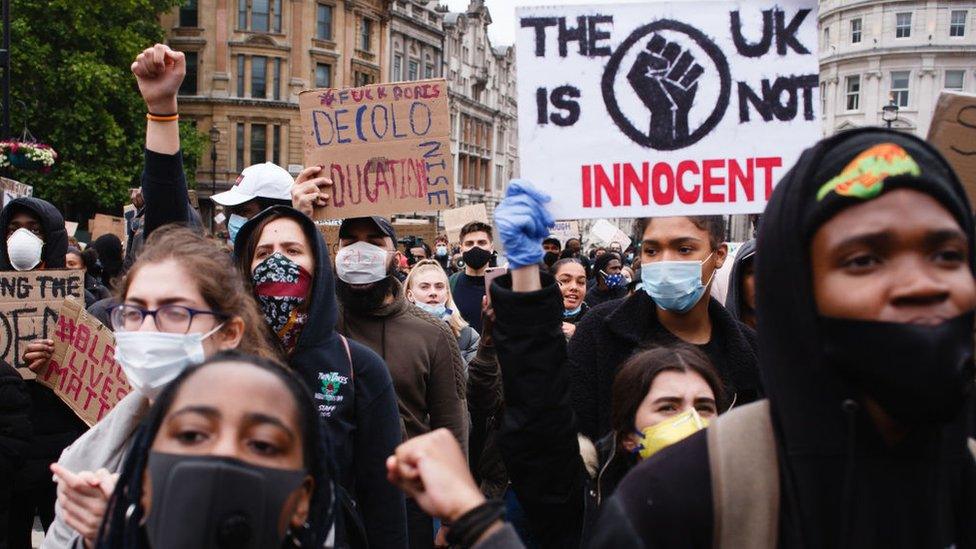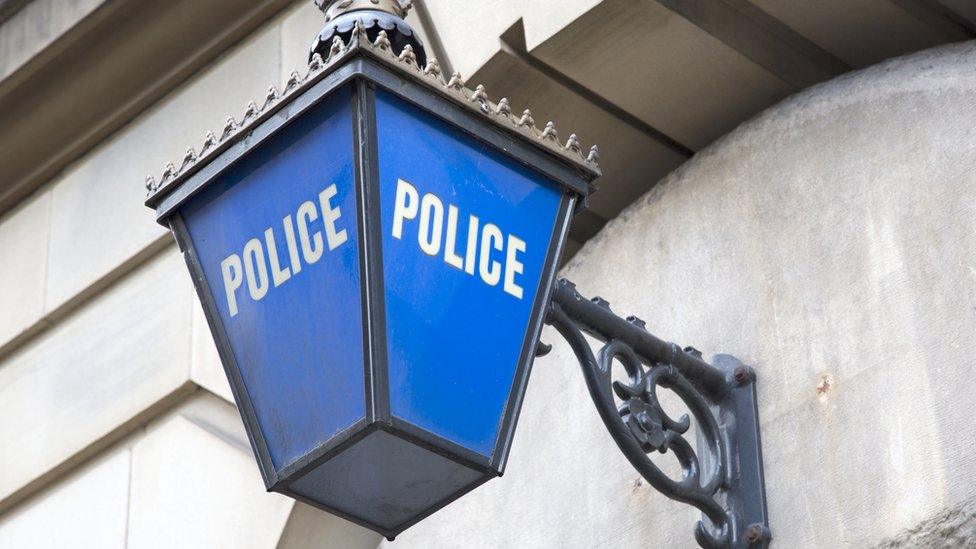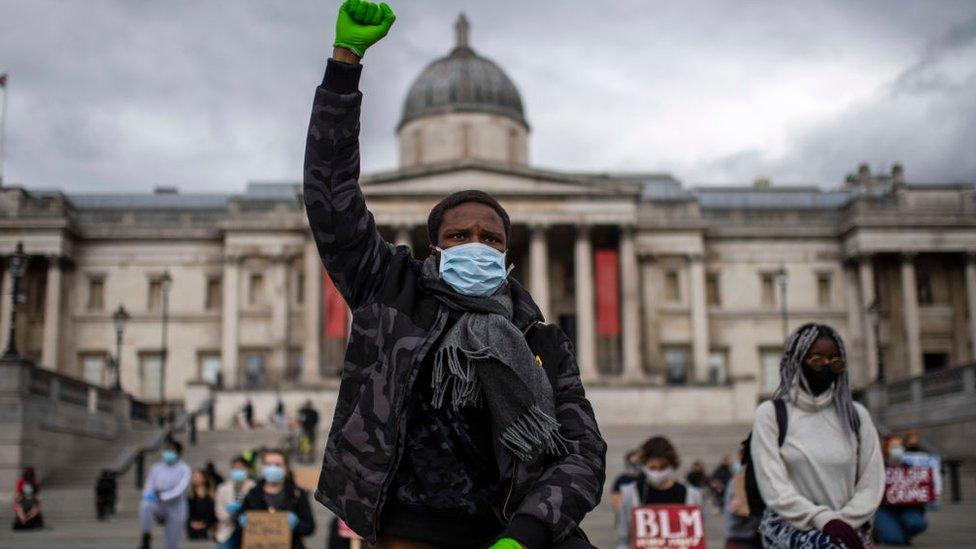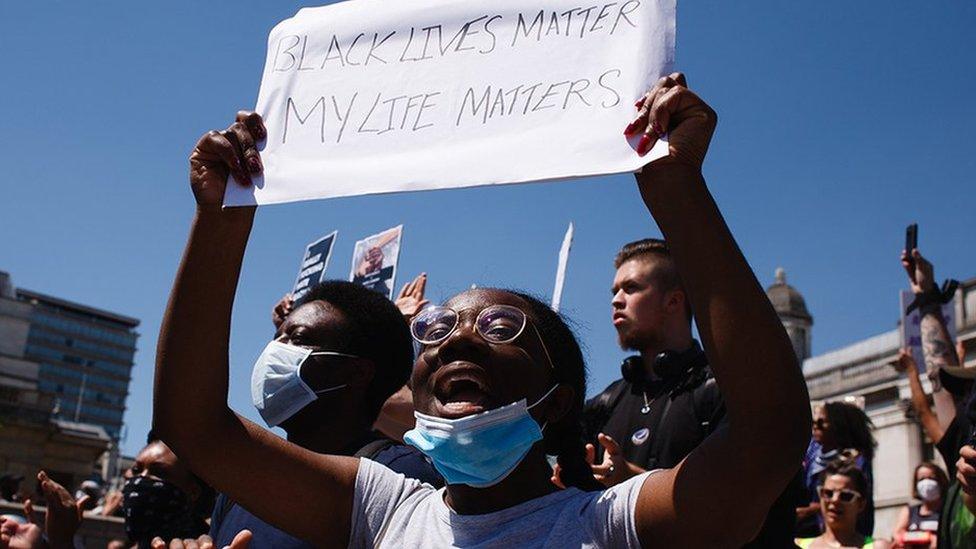Police watchdog: 'If you're unhappy with the police, complain'
- Published

"The UK is not innocent" was one of the protest's rallying cries
The police watchdog says it needs to do more to build trust with young people and ethnic minorities.
The Independent Office for Police Conduct (IOPC) handles the most serious complaints against police in England and Wales.
Sal Naseem, regional director for London, says their own research shows "strong evidence" of minorities being treated differently.
This includes "use of Tasers and stop and search".
Sal Naseem tells Radio 1 Newsbeat Black, Asian and minority ethnic people (BAME) are being treated disproportionately "across ranging policing issues".
"But figures show those people aren't taking out a complaint," he adds.
He says out of 30,212 complainants last year, only 4% came from Black people, 5% from Asian people and 1% of young people.
"Perhaps they don't feel confident in raising concerns, but the problem is when we go to the police service to talk about it, they say, well, we don't get the complaints."
Mr Naseem is encouraging people to complain if they're unhappy with police treatment.
Complaints can be done on the IOPC website. But many say the problem is that ultimately any complaint you make - either to the police, or through the IOPC website - gets looked at by the very organisation you're complaining about.
They then decide whether to refer your complaint about them to the IOPC.
And that doesn't always happen.

Wretch 32 posted a video on Twitter of his father falling downstairs after being Tasered by officers in Haringey
Last week rapper Wretch 32 shared a video of his 62-year-old father being Tasered by police in April.
London's Metropolitan Police said it didn't meet the criteria to pass it through to the IOPC but Mr Naseem has taken a different view.
"That is something that I was personally involved in and I used one of our new powers to make sure that the Met Police did refer this through to us, because for me, there was a really important point about public confidence."
He denies the IOPC was forced into this position after the video went viral.
But what about potential cases where there are no videos?
"It's an important point - there are things that we wouldn't necessarily be aware of.
"So it's important to know about the complaints system - if you've had an interaction with the police, and you're unhappy about it, you must do something about it."
Last month the IOPC launched an inquiry following allegations of racially motivated brutality including the use of stun guns by officers in Birmingham.
It's looking into six allegations against the West Midlands police on black men in the city.
The IOPC says the investigations will be full, fair and thorough.
Mr Naseem says generally, there is an element of managing public expectations.
"We hear a lot of criticism about why officers aren't prosecuted, and I understand where the criticism comes from, but I also I think it's really important to highlight we are one part of a system.
"We can take the matter so far, there are other bodies that come into play - the Crown Prosecution Service and the legal system."

The handling of complaints varies from force to force, the IOPC said
Some Newsbeat listeners have told us they don't trust the complaints system, with one asking "isn't the IOPC just all retired officers who support the police?"
Mr Naseem says: "I don't have any police background and I think it's only around 15% of our staff that do.
"We're an independent body from government and from the police service, we take no sides."
The killing of George Floyd in the US has sparked global protests against police brutality.
Many protestors and campaigners here believe the US and UK police have similarities pointing to the cases of Mark Duggan, Dalian Atkinson and Rashan Charles.
"America has got a completely different system. They police by force and they don't have any model like us - strict and rigorous - to hold the police to account."
"If we get incidents like George Floyd we would expect these things to be sent through to us to investigate."
Mr Naseem points out his own experience with police.
"I grew up with racism and I was stopped and searched when younger and felt humiliated by it.
"After that I've had really positive experiences with the police. My dad ran a shop, and he used to get all sorts of bother and the police were great to us.
"So I've got that kind of balanced experience."
He recognises the criticism the IOPC faces - accusations of not processing the right cases and being too complex.
"Building trust doesn't happen overnight. It's incremental, isn't it? It's not what you say, it's what you do.
"But by not engaging in the system that's there, then nothing can truly change."
An earlier version of this article incorrectly stated there were 30,212 complaints, rather than complainants.


Follow Newsbeat on Instagram, external, Facebook, external, Twitter, external and YouTube, external.
Listen to Newsbeat live at 12:45 and 17:45 weekdays - or listen back here.
- Published13 June 2020

- Published10 June 2020
